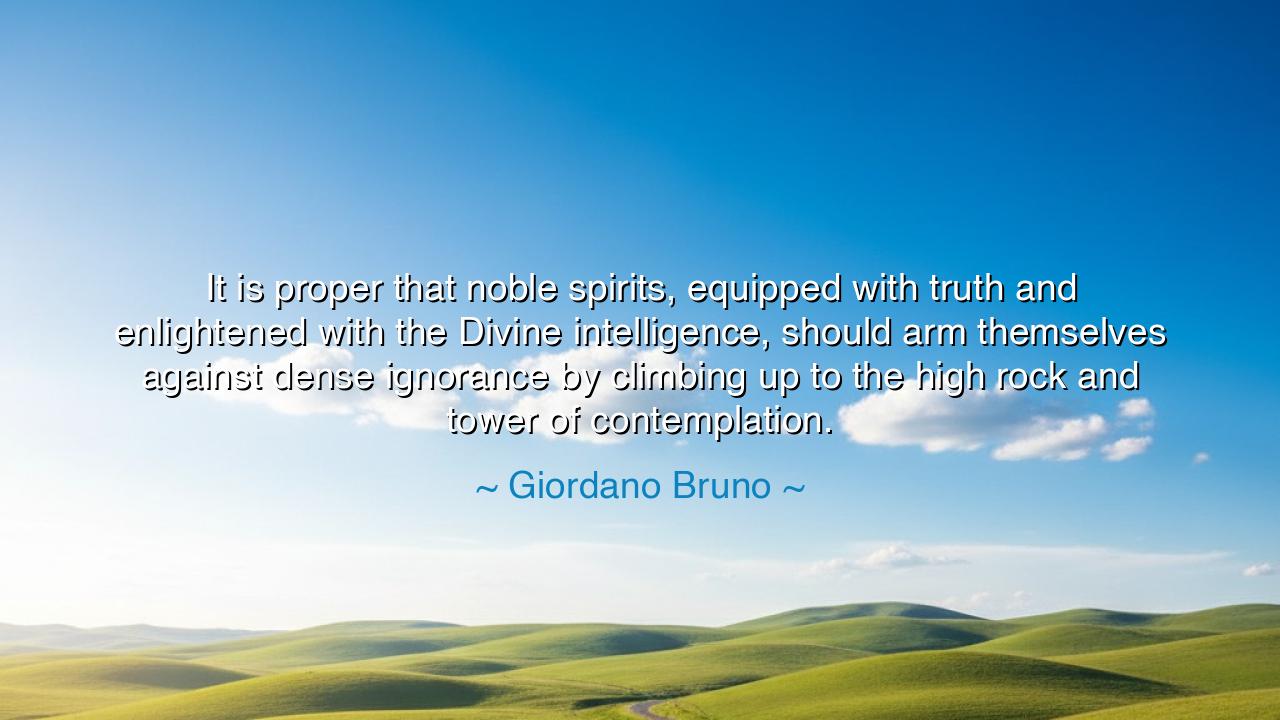
It is proper that noble spirits, equipped with truth and
It is proper that noble spirits, equipped with truth and enlightened with the Divine intelligence, should arm themselves against dense ignorance by climbing up to the high rock and tower of contemplation.






The words “It is proper that noble spirits, equipped with truth and enlightened with the Divine intelligence, should arm themselves against dense ignorance by climbing up to the high rock and tower of contemplation” were spoken by Giordano Bruno, the philosopher, poet, and visionary who, in the sixteenth century, defied the narrow walls of dogma to proclaim the infinity of the universe. These words are the cry of a soul who gazed beyond the boundaries of his time—a man who saw that the greatest battles of the spirit are not waged with swords, but with the weapons of truth, wisdom, and contemplation. In this quote, Bruno calls upon all noble spirits—those who seek enlightenment and love truth above comfort—to rise above the clouds of ignorance, not through rebellion of violence, but through the ascension of understanding.
Bruno lived in an age when thought was confined by fear. The Church ruled not only men’s bodies but their minds, and to question its authority was to risk death. Yet Bruno’s Divine intelligence, the fire of his intuition, urged him to see further. He beheld an infinite cosmos, where every star was a sun and every sun a potential cradle of life. For such ideas—truths too vast for the smallness of his time—he was condemned. But before the flames of his martyrdom, he uttered the kind of words that echo forever: that the mind of man must ascend, like a climber toward a mountain’s peak, to behold truth from a place where ignorance cannot reach.
When he speaks of the “high rock and tower of contemplation,” Bruno uses the language of the mystic and the philosopher alike. The rock is the firmness of reason and faith combined; the tower is the height of meditation, the elevation of the soul above the clamor of the world. To contemplate is not to withdraw, but to see more deeply—to rise from confusion into clarity. Only from such a vantage point can one defend truth against the darkness of prejudice and fear. In Bruno’s vision, contemplation is not a luxury—it is an act of courage, a sacred duty for all who would stand as guardians of light in a world clouded by deception.
Throughout history, such noble spirits have appeared in every age. Consider the story of Galileo Galilei, who, a generation after Bruno, lifted his telescope to the heavens and saw proof of what Bruno had already intuited: that the Earth is not the center of creation. Galileo, too, faced the wrath of ignorance, yet he armed himself not with anger, but with evidence, logic, and perseverance. Like Bruno, he climbed to his own “tower of contemplation” and saw truth shining through the veils of superstition. Though forced to recant, his discoveries lived on, illuminating the minds of those who came after him. This is the pattern of all progress: that enlightenment, though persecuted, cannot be extinguished.
Bruno’s wisdom reminds us that ignorance is not merely the absence of knowledge—it is the willful rejection of it. It is dense because it resists light; it clings to comfort and fears the unknown. Against such darkness, Bruno urges us to arm ourselves—not with contempt, but with contemplation; not with arrogance, but with the humility that seeks truth for its own sake. For contemplation is both shield and sword: it strengthens the spirit against despair and sharpens perception against deceit. It allows the seeker to see beyond illusion and to recognize truth as something divine, eternal, and liberating.
To live by this teaching is to cultivate the habit of reflection. Each day, one must ascend in thought—detach for a moment from noise and vanity, and rise to that “tower of contemplation” within the self. There, in silence, we meet the greater intelligence that Bruno called Divine—the light that guides conscience and nourishes creativity. In that stillness, we rediscover the eternal truth that to think deeply is to pray, to question boldly is to honor creation, and to know oneself is to glimpse the mind of God.
Let this be your practice, O seeker of wisdom: when faced with confusion or fear, do not descend into anger or submission. Instead, climb. Climb to the tower of thought, where the winds of truth are clear and strong. There, arm yourself with knowledge, with reason, and with compassion. For ignorance thrives only where thought is silent. As Giordano Bruno reminds us, the noblest act of all is to see, to understand, and to share the light of that understanding with others.
And remember his legacy: though his body was consumed by flame, his spirit ascended to the very tower he described. His words outlived his oppressors; his ideas outshone the darkness that sought to destroy them. So too may your own light endure, if you live not in fear, but in contemplation—armed always with truth, guided by Divine intelligence, and unyielding before the mists of ignorance. For in this way, you join the eternal lineage of those noble spirits who keep the torch of enlightenment burning through the ages.






AAdministratorAdministrator
Welcome, honored guests. Please leave a comment, we will respond soon